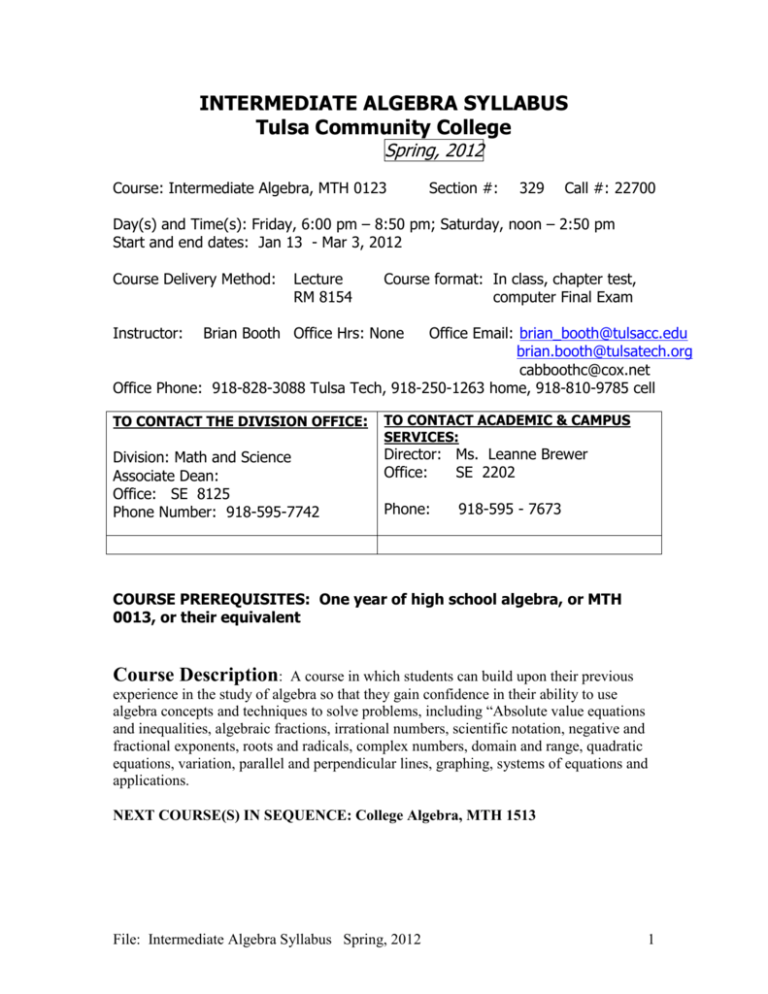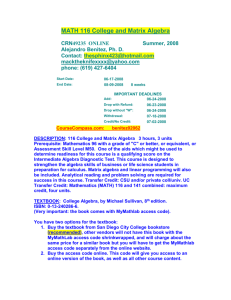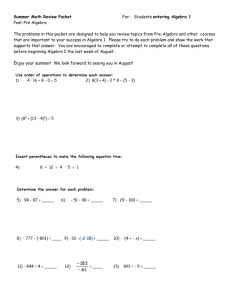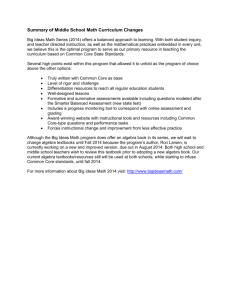MATH_0123_329_22700_201220
advertisement

INTERMEDIATE ALGEBRA SYLLABUS
Tulsa Community College
Spring, 2012
Course: Intermediate Algebra, MTH 0123
Section #:
329
Call #: 22700
Day(s) and Time(s): Friday, 6:00 pm – 8:50 pm; Saturday, noon – 2:50 pm
Start and end dates: Jan 13 - Mar 3, 2012
Course Delivery Method:
Instructor:
Lecture
RM 8154
Course format: In class, chapter test,
computer Final Exam
Brian Booth Office Hrs: None
Office Email: brian_booth@tulsacc.edu
brian.booth@tulsatech.org
cabboothc@cox.net
Office Phone: 918-828-3088 Tulsa Tech, 918-250-1263 home, 918-810-9785 cell
TO CONTACT THE DIVISION OFFICE:
Division: Math and Science
Associate Dean:
Office: SE 8125
Phone Number: 918-595-7742
TO CONTACT ACADEMIC & CAMPUS
SERVICES:
Director: Ms. Leanne Brewer
Office:
SE 2202
Phone:
918-595 - 7673
COURSE PREREQUISITES: One year of high school algebra, or MTH
0013, or their equivalent
Course Description:
A course in which students can build upon their previous
experience in the study of algebra so that they gain confidence in their ability to use
algebra concepts and techniques to solve problems, including “Absolute value equations
and inequalities, algebraic fractions, irrational numbers, scientific notation, negative and
fractional exponents, roots and radicals, complex numbers, domain and range, quadratic
equations, variation, parallel and perpendicular lines, graphing, systems of equations and
applications.
NEXT COURSE(S) IN SEQUENCE: College Algebra, MTH 1513
File: Intermediate Algebra Syllabus Spring, 2012
1
TEXTBOOKS, SUPPLIES, & OTHER RESOURCES:
Title: Algebra Foundations
Author: Elayn Martin-Gay and Margaret
Greene Publisher: Pearson Publishing
*Textbooks supplements are available through MyMathLab. All are available
through the campus bookstore. A graphing calculator, preferably TI 83+ or
higher, is required in this course.
MyMathLab/coursecompass generic code:
campus94565 This
was prepared by Linda Houston and it will show her, not Brian Booth as
the teacher. Do not be concerned when you see this statement.
Note: if you buy a used intermediate algebra textbook, you will need
to purchase coursecompass in order to take the course final exam. The
cost of coursecompass for intermediate algebra is $92.00. If you have
taken other prerequisite courses prior to Intermediate Algebra using
this same textbook, your membership in coursecompass is still active.
You need to “enter a new course” with your old username and
password.
To enroll in CourseCompass:
You need the enrollment code from your textbook to validate
that you have paid for access to coursecompass/mymathlab.
Go to www.coursecompass.com
Then click on “register” now create your name, password
Then click on “Continue a course, re-take a course, or
switch to a different course section”
Click “Next”
Now enter your user name and password
Click “Enroll”
Enter “campus94565” the generic course ID
Click “Next”
Click “Enter Course Now”
Choose your user name________________________
Choose your password ________________________
Keep this so that you can take your final exam!
In order to take your final exam, you will logon
in the TCC computer network. You will need
your tcc user name (typically first_last) and
File: Intermediate Algebra Syllabus Spring, 2012
2
password (that you have chosen). Please write
down your username ______________ and
your chosen password ______________
(remember your password must contain a
capital letter, a lower case letter and a
number).
You will take the final exam as a new course on CourseCompass. You
must be enrolled in CourseCompass this semester for Intermediate
Algebra and for my class. Transferring from another class will not
work. If you cannot enter CourseCompass on the night of the final
exam, you will not be able to take the final exam.
Scope of the Course: Chapter by chapter – minimal (core) sections required
Ch 15 Sections 1, 2,
Ch 16 Sections 1, 2, 3, 4, 5
Ch 17 Sections 1, 2, 3
Functions, Linear Equations, and Models
Systems of Linear Equations and Problem Solving
Inequalities and Problem Solving
Ch 18 Sections 1, 2, 3, 4, 5
Rational Expressions, Equations, and Functions
Ch 19 Sections 1, 2, 3, 4, 5, 6
Exponents and Radical Functions
Ch 20 Sections 1, 2, 3
Quadratic Functions and Equations
* Linear regression is Enrichment, not core (we are covering only the core
sections).
UNIVERSAL HOMEWORK ASSIGNMENTS
Each homework assignment will consist of all problems presented in the Section
Exercise Set and Mixed Practice that end in the numbers “3” and “7”; you should omit
any problems found the sections entitled: Review and Preview, and Concept
Extensions. This will be approximately 20% of the problems presented in each Exercise
Set. (It is my hope that this number of problems will be adequate for you to master the
concepts of the course. Do not be hesitant to work additional problems in order master
the concepts of the course.) In the back of the book you will find the answers to the odd
numbered problems. Your MyMathLab supplement contains guides for using graphing
File: Intermediate Algebra Syllabus Spring, 2012
3
calculators, a solutions manual for odd numbered problems, tutorials for the concepts
presented in the text, and more. These supplements can be a very valuable study aide.
Such a tool will be very helpful concerning your homework but they would be a
disadvantage on your tests and on the final if you only copy answers but do not gain
understanding of the concepts used. We will spend much class time explaining the
homework problems from beginning to end including the terminology and exploring the
quirks of the number crunching parts of the individual problems. On any homework
problems where there is any computation to be done, you must “show your work”.
Partial credit will be allowed; please show me your thought process. Please put your
name and chapter number on every page of your homework.
Please do not work any word problems for your homework. We will give consideration
to word problems at the end of the course.
COURSE OBJECTIVES:
Upon successful completion of this course students will be able to—
o Perform the basic stills of algebra and develop and maintain proficiency and
confidence in algebraic skills to prepare the student for higher mathematics
courses. Specifically, the course skills include analytical reasoning, problem
solving techniques, graphs, polynomial, rational, exponential and logarithmic
functions, systems and matrices, conic sections, sequences, series and
combinations.
TEACHING METHODS: Lecture, class discussion, and overhead
demonstrations will be used. Questions are encouraged.
EVALUATION TECHNIQUES: Class participation, homework, tests, and
a final exam will be the components of the class grade. Each chapter
will be graded regarding classroom participation (10%), homework
(40%), and test grade (50%). The average of the chapter grades will
represent 80% of the total class grade. The remaining 20% of the
total class grade will come from the Final Exam.
Grading Scale:
100 – 90 = DA
Grade has a prefix of D for Developmental
89 - 80 = DB
79 - 70 = DC
69 - 60 = DD
59 - 0 = DF
Grades will be rounded to the closest whole percentage point.
File: Intermediate Algebra Syllabus Spring, 2012
4
ATTENDANCE: Minimum of 80% attendance required. Attendance below 80%
will reduce the final grade in the course by 10%.
LATE ASSIGNMENTS AND MAKE-UP WORK: With advance permission,
late assignments will be accepted without penalty. Without advance
permission, a 10% penalty on the earned grade for the
assignments/work that is late will be applied.
10. Course Withdrawal: The deadline to withdraw from a course shall not
exceed 3/4 the duration of any class. Contact the Counseling Office at any
TCC campus to initiate withdrawal from a course ('W' grade) or to change
from Credit to Audit. Check the TCC Academic Calendar for deadlines.
Students who stop participating in the course and fail to withdraw may
receive a course grade of “F,” which may have financial aid consequences for
the student. Students, who do not ever attend this class but are enrolled in this class, will
receive a grade of “WN” after the 2nd week of the course.
Course Withdrawal: the deadline to withdraw from a
course shall not exceed ¾ the duration of any class.
Check the TCC Academic Calendar for the deadline that
applies to this course. Begin the process with a
discussion with the faculty member assigned to the
course. Contact the Advisement Office at any TCC
campus to initiate withdrawal from a course (‘W’ grade) or
to change from Credit to Audit. Withdrawal and/or
change to an audit from a course after the drop/add
period can alter the financial aid award for the current
and future semesters. Students may receive an
outstanding bill from TCC if the recalculation leaves a
balance due to TCC. Students who stop participating in
the course and fail to withdraw may receive a course
grade of “F,” which may have financial aid consequences
for the student.
File: Intermediate Algebra Syllabus Spring, 2012
5
COMMUNICATIONS:
Email: All TCC students receive a designated “MyTCC” email address (ex:
jane.doe@mail.tulsacc.edu). All communications to you about TCC and
course assignments will be sent to your MyTCC email address; and you must use
MyTCC email to send email to, and receive email from, the instructor regarding
this course.
Inclement Weather: TCC closes from time to time. If extreme weather
conditions or emergency situations arise, TCC always gives cancellation notices
to radio and television stations. Listen exclusively for weather and closing
statements about Tulsa Community College and specifically for the Southeast
Campus. Tulsa Community College is not Tulsa Public Schools and it is not Tulsa
Technology Center; do not assume that if one of these entities is closed that
Tulsa Community College is also closed. This information is also posted on the
TCC website (www.tulsacc.edu).
GENERAL EDUCATION GOALS: General Education courses at TCC ensure
that our graduates gain skills, knowledge, and abilities that comprise a common
foundation for their higher education and a backdrop for their work and personal
lives. TCC’s General Education goals are: Critical Thinking, Effective
Communication, Engaged Learning, and Technological Proficiency.
CLASSROOM ETIQUETTE: Open and mutually respectful communication of
varied opinions, beliefs, and perspectives during classroom or online discussion
encourages the free exchange of ideas that is essential to higher learning and to
the ability to learn from each other. Use of any electronic device is at the
discretion of the instructor.
SYLLABUS CHANGES: Occasionally, changes to the syllabus may be
necessary. Students will be notified of any changes to the syllabus in writing.
GENERAL EDUCATION GOALS: General Education courses at TCC ensure
that our graduates gain skills, knowledge, and abilities that comprise a common
foundation for their higher education and a backdrop for their work and personal
lives. TCC’s General Education goals are: Critical Thinking, Effective
Communication, Engaged Learning, and Technological Proficiency.
File: Intermediate Algebra Syllabus Spring, 2012
6
CLASSROOM ETIQUETTE: Open and mutually respectful communication of
varied opinions, beliefs, and perspectives during classroom or online discussion
encourages the free exchange of ideas that is essential to higher learning and to
the ability to learn from each other. Use of any electronic device is at the
discretion of the instructor.
SYLLABUS CHANGES: Occasionally, changes to the syllabus may be
necessary. Students will be notified of any changes to the syllabus in writing.
STUDENTS WITH DISABILITIES: TCC provides accommodations for
qualifying students in compliance with the Americans with Disabilities Act. For
information, students may contact the disabled Student Resource Center, 918595-7115, or the Resource Center for the Deaf and Hard of Hearing, 918-5957428V, 918-595-7434TTY.
ACADEMIC DISHONESTY: Academic dishonesty (cheating) is defined as the
deception of others about one’s own work or about the work of another.
Academic dishonesty or misconduct is not condoned or tolerated at campuses
within the Tulsa Community College system. Tulsa Community College adopts a
policy delegating certain forms of authority for disciplinary action to the faculty.
Such disciplinary actions delegated to the faculty include, but are not limited to,
the dismissal of disrespectful or disorderly students from classes. In the case of
academic dishonesty a faculty member may:
Require the student to redo an assignment or test, or require the
student to complete a substitute assignment or test;
Record a "zero" for the assignment or test in question;
Recommend to the student that the student withdraw from the class,
or administratively withdraw the student from the class;
Record a grade of "F" for the student at the end of the semester.
Faculty may request that disciplinary action be taken against a student
at the administrative level by submitting such a request to the Dean of
Student Services.
INSTITUTIONAL STATEMENT: Each student is responsible for being
aware of the information contained in the TCC Catalog, the TCC Student
Policies & Resources Handbook, and semester information listed in the
class schedule. All information may be viewed on the TCC website:
www.tulsacc.edu
File: Intermediate Algebra Syllabus Spring, 2012
7
TENTATIVE COURSE CALENDAR:
Week 1: Jan 13, 14 Friday - Overview of Course, Review of Algebra Concepts
Saturday - Lecture Ch 15, 16
Week 2: Jan 20, 21
Friday - Lecture Ch 16, 17
Homework Ch 15
Saturday - Homework/Review Ch 15, 16
Week 3: Jan 27, 28
Friday - Homework Ch 16, 17 Lecture Ch 16, 17
Saturday - Review ** Ch 15, 16, 17 Test **
Sample Final - Booth
Week 4: Feb 3, 4
Friday - Lecture Ch 18, 19, 20 (handout – pretest for Ch 18, 19, 20)
Chapter 15, 16, 17 Homework Due
Saturday – Lecture Ch 18, 19, 20 Sample Final handout – clean
Week 5: Feb 10, 11 Friday - Homework Ch 18, 19
Saturday - Homework Ch 19, 20
Week 6: Feb 17, 18 Friday - Homework Ch 18, 19, 20
Saturday - Review Ch 18, 19, 20
** Ch 18, 19, 20 Test **
Week 7: Feb 24, 25 Friday - Word Problems, Review Ch 15, 16, 17
Chapter 18, 19, 20 Homework Due
Saturday - Review Ch 18, 19, 20
Week 8: Mar 2, 3 Friday - Review for Final
Saturday - ** Final Exam ** 32 problems, 1:50 time limit Computer
Final You must be enrolled in CourseCompass for this course in
this semester in order to take the final exam. The exam will be a
new course offered to you.
The MathLab is open 9:00 am to 12:00 pm on Saturdays, but the Testing Center is closed
on Friday and Saturday.
The MathLab is staffed with math tutors to aid students, but they are not to tutor students
one-on-one, but rather to assist students. The MathLab does have textbooks, solutions
manuals, graphing calculators, and personnel to guide you in solving 1 or 2 questions at a
time. Please note that MyMathLab has tutorials, solutions manuals for odd numbered
problems, etc.
Chapter Tests
Chapter tests will occur beginning the last 45 minutes of class on the day scheduled.
Students may take time beyond the end of class to finish a test or quiz. I will wait on
students to complete their tests. Each chapter test will normally consist of five problems.
Partial credit will be given. I will be pleased to award any and every student in the class
File: Intermediate Algebra Syllabus Spring, 2012
8
an “A” based upon the quality of his or her work; giving such grades is my goal. Each
student will receive his/her graded chapter test back the following week. Individual
conferences can be scheduled before or after class on Fridays or Saturdays. Please give
me a little notice if you need to meet about your grade or your progress in the course.
Final Exam Required Text:
COINTERMEDIATE ALGEBRA
There will be a comprehensive computerized final exam, utilizing the CourseCompass software.
You may not use your own books, notes, or scratch paper during this exam. Calculators may not
be shared during the exam. Common finals are given to all Beginning &Intermediate Algebra,
Intermediate Algebra, and College Algebra Classes. To assist students in preparing for these
exams, the following policies have been established.
1. The common final will be the only exam for this class given during finals week.
2. Each student should receive instructions for accessing a sample final.
3. Students may use a calculator.
4. A list of standard formulas will be supplied with the exam (College Algebra only).
To earn a grade of A, B, or C in this course, the department requires that you must
also score at least 50% on the common final exam.
Any exceptions to this must be appealed by your instructor to the division chair.
From Mr. Booth: The final exam is mandated to be a departmental exam. I will not write
this exam, nor will I know exactly what the individual questions are on the exam. The
rules do not allow the use of your textbook, notes, or personal scratch paper. A calculator
can be used, but they cannot be shared during the exam. You will receive instructions
about how to access a sample final exam that will be similar to the actual final exam.
Students must score a minimum of 50% on this final exam in order to be awarded a grade
of A, B, or C for the course. Any exceptions to this standard must be appealed by your
instructor to the Division Chair.
This semester the final exam is a computer exam. The test will be multiple choice and
there will be no partial credit. Each student must be enrolled in Course Compass in order
to take the Final Exam. We will spend time in class reviewing the ways that questions are
posed, the use of terminology, and the concepts tested on this final exam. Our
preparation is intended to enable students to clearly understand each question that is
asked without confusion created by the terminology or created by the style of the
question.
Let’s have fun with math in this course, and pass it. This course is the prerequisite course
for College Algebra. This might be your last class in mathematics or just the beginning
of your exposure to some great ideas from statistics and/or calculus.
Brian Booth
File: Intermediate Algebra Syllabus Spring, 2012
9




